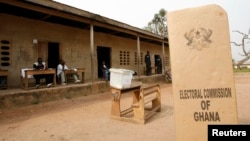The electoral commission of Ghana is rejecting criticism it is doing the bidding of the ruling National Democratic Congress by deleting the names of supporters of the main opposition New Patriotic Party from voter lists.
The electoral commission is preparing for November 7 presidential, parliamentary and local elections.
Following an order from the Supreme Court, the electoral commission this week began expunging the names from the voter list of those who registered using their National Health Insurance Scheme identification card .
But Samuel Pyne, the Ashanti Regional Secretary of the NPP, said the electoral commission deleted the names of party supporters who did not use their National Health Insurance Scheme (NHIS) identification cards.
Local media quoted Pyne as saying, “They should look at the pressure at the EC offices, especially in Ashanti region, lots of people there, and people are getting frustrated, people feel the NDC is manipulating the system at the EC’s office in Ashanti region. Those who go there are frustrated, telling us that when NDC officials come there, the system changes in favor of NDC, if that is a fact, they should do something about it to redeem their image,” Pyne said.
In an interview with VOA, Eric Dzakpasu, electoral commission spokesman, said the accusations are without merit. He says the electoral commission collects basic information about the prospective voter and the type of identification used for the registration.
Dzakpasu also says the accusation of deliberately deleting the names of the NPP to boost the chances of the governing NDC in the upcoming polls doesn’t make sense.
“I am saying it is baseless, it is not possible, it cannot be done because there is no way you can identify supporters of any political party on the electoral role,” said Dzakpasu. “It is not possible for any particular individual just by taking a look at the electoral roll to know which party an individual supports or belongs to.”
“This exercise of deletion of names was based on people who used the NHIS card to register in 2012, and when you go to form 1A, which is the primary document from which these names are extracted, all that you find is the names of the people and the kind of document they used to register. So, there is no way, and it doesn’t even make logical sense that the electoral commission as a body, made up of a lot of individuals could just sit down and then fish out the names of persons, who belong to any political party, and to delete them.”
Some Ghanaians have questioned the relationship between officials of the electoral commission, stakeholders and the political parties.
They contend that the criticisms could have been avoided if the parties and the stakeholders are well informed and made to be part of the process of the compilation of the voter list. They say this could enhance transparency and ensure the parties have confidence in the electoral commission's impartiality and its effort to administer credible polls this year.
Dzakpasu answers, “There is always constant regular interaction between the Electoral Commission of Ghana and the political parties to the extent that the regular meetings between the political parties and the electoral commission has been institutionalized. We call it the Interparty Advisory Committee [IPAC] and they meet once every month. When the need arises we meet as frequent as we should be meeting and at such meetings issues of concerns are brought to the fore for discussions, consensus is built around a lot of issues before they are rolled out to the public,” said Dzakpasu.
“The modalities of the deletion of the names of persons from the voters roll, was presented to the political parties at an IPAC meeting before the commencement of the exercise. So yes, [political parties] are involved in every activity of the electoral commission.”
Critics say the electoral commission appears not to be doing enough public engagement activities to educate Ghanaians and prospective voters about its preparations for the elections. Dzakpasu says the criticisms are unjustified.
“The electoral commission of Ghana is up to the scratch in its publicity and voter education drives. We have developed jingles, which are played regularly on most of the radio FM stations. We have television promos and drama shows all over the TV stations and we have engaged with stakeholders at the local level. Our district offices are embarking upon intensive publicity drives across the length and breadth of this country, educating and mobilizing people to take part in these exercises,” said Dzakpasu.




